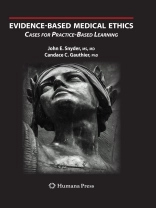In the modern practice of medicine, new challenges complicate the ethical care of patients. Today’s times require a contemporary take on the concept of medical ethics. The idea for this textbook was born out of a need for a teaching resource that merges medical ethics theory with the practical needs of modern clinical medicine. In Evidence-Based Medical Ethics: Cases for Practice-Based Learning, the authors address what has been missing in existing text books and ethics courses to date – clear-cut ethical and legal guidelines that provide a method for the reader to learn how to systematically manage dilemmas seen in the everyday practice of medicine. The reader is guided through several ‘typical’ patient scenarios and prompted by various questions that should be entertained by the treating health care provider. Then, relevant evidence-based medicine, legal precedent, and the ethical theory that applies to the situation are revealed. Often, finding the ‘best’ ethical solution for each problem is automatic, as the solution often becomes self-evident during information-gathering. This general method is reinforced throughout the text with multiple different cases, using a practice-based approach by building on the reader’s developing skills. Additionally, we have sought to emphasize a culturally competent manner in resolving these dilemmas, respectfully addressing issues of age, gender, and culture whenever possible. The main goal of Evidence-Based Medical Ethics: Cases for Practice-Bases Learning is to assist the reader in adapting a patient-centered and evidence-based approach to dilemmas faced in their future practice of medicine.
Tabla de materias
A brief introduction to medical ethics in Internal Medicine.- The underlying principles of ethical patient care.- Putting ethics into practice – realities, limitations, and roadblocks.- Advanced Directives, Living Wills, and the Health Care Power of Attorney (HCPOA).- Case-based ethical dilemmas.- Topic: Consent in the mentally ill or otherwise unfit (and ‘in between’ situations: delirium, psychiatric decompensation).- Topic: When the HCPOA neglects their responsibility, or has other personal interests/potential gains.- Topic: When the patient/their family bullies practitioners into unnecessary diagnostics/therapeutics.- Topic: When an estranged family member or spouse suddenly appears to make decisions.- Topic: How to deal with an inpatient behaving badly (psych consults, behavioral contracts, room restriction etc.).- Topic: When DSS consults are needed.- Topic: When a patient has ‘burned all bridges’ and no discharge planning is possible.- Topic: Can a practitioner refuse to admit a patient? To see a patient in the office (e.g. administrative discharge)?.- Topic: When a patient makes ‘bad’ decisions (e.g. will accept some therapies and not others, such as some blood products but not others, some procedures but not others, DNI but not DNR, etc.).- Topic: When a patient’s same-sex partner has no legal rights and is excluded by a family.- Topic: When a patient has a contagious disease (e.g. HIV) and their partner is not aware.- Topic: When a family will not accept a terminal prognosis (i.e. futile ‘full codes’).- Topic: When there is no one to make decisions for a patient (e.g. John/Jane Doe in ICU, wards of the state).- Topic: When a mistake has been made by a practitioner (what/how to/how much to disclose).- Topic: When what a patient needs cannot be obtained (e.g. financial/insurance limitations).- Topic: When next-of-kin (NOK) disagree with each other.- Topic: When a toxicology screen is ordered without patient consent and comes backpositive.- Topic: When a patient ‘signs out against medical advice’.- Topic: When a patient requests a clinical interaction be recorded.- Topic: When a family member requests patient information not be shared with the patient, or with other persons.- Topic: When a patient requests to not be seen by a (specific, or any) medical resident or student.- Topic: When a patient requires or demands large amounts of time from a practitioner.- Topic: How to prescribe medications to someone who has attempted suicide (e.g. with pills).- When a colleague demonstrates suspicious behavior.- Topic: When a language translator is not available (or only a family member/hospital employee is).- Topic: When a patient is repeatedly readmitted to the hospital due to non-adherence (e.g. with therapy, diet, etc.).- Topic: When lawyers or law enforcement want to know patient information (HIPAA/confidentiality and the law).- Topic: When a patient requests disability certification, handicap plates, etc. – or when they request renewal of a revoked driver’s license (e.g. can a practitioner-patient relationship be maintained when a patient doesn’t get what they want?).- Topic: How much resources should be spent on a single patient’s case? (i.e. public health cost v. value of human life).- Topic: How much information must a practitioner share with a patient?.- Topic: How to deal with a patient seeing two or more practitioners (same specialty, overlapping meds, etc.).- Topic: How to manage chronic pain (e.g. are ‘pain contracts’ ethical?; how is pain objectively assessed?).- Topic: At what age, if any, do you stop health maintenance disease screening?.- Topic: When can a practitioner withhold therapy from a patient based on their behavior?.- Topic: When a Jehovah’s witness needs a blood transfusion.- Topic: How far does screening go?.- Comprehensive Exam.- Suggested reading and internet resources.- Glossary of terms.- Index.












